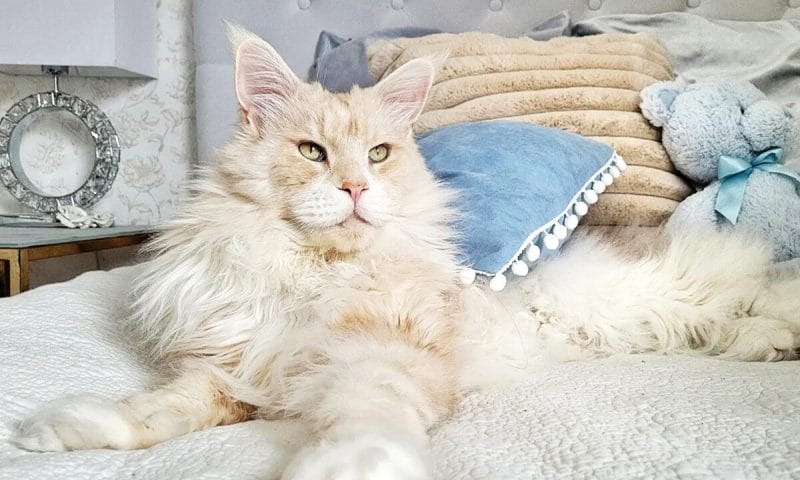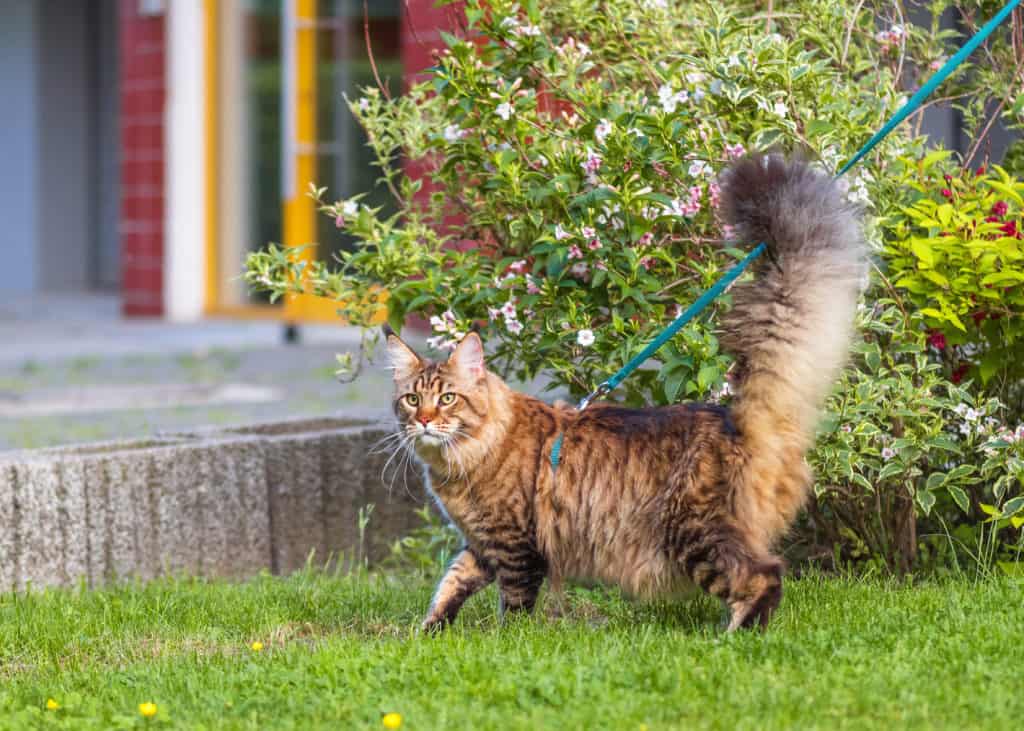The Maine Coon cat, often referred to as the “gentle giant” of the feline world, is a magnificent breed with a fascinating history. Originating in the United States, particularly the state of Maine, this breed has captured the hearts of cat enthusiasts around the world. In this comprehensive guide, we will explore everything you need to know.
Affectionate with Family: ⭐⭐⭐⭐⭐
Maine Coons form extremely strong bonds with their families. They crave attention and affection. This is an loyal cat that will follow family members throughout the house and always want to be near you.
Amount of Shedding: ⭐⭐⭐
The thick double coat of the Maine Coon does shed seasonally in the spring and fall. Daily brushing when shedding can help contain loose hair. Overall, the shedding is manageable with routine grooming.
General Health: ⭐⭐⭐⭐
Maine Coons are typically quite hearty and healthy. Selecting reputable breeders who screen for health problems helps ensure genetic soundness. This athletic breed may be prone to hip dysplasia later in life.
Potential for Playfulness: ⭐⭐⭐⭐⭐
Extremely playful cats, Maine Coons love interactive toys and games. They enjoy pouncing, chasing, and retrieving. Be prepared to dedicate time each day for vigorous play sessions. This is an energetic and entertaining breed.
Tendency to Vocalize: ⭐⭐
While not usually overly vocal, Maine Coons will use their soft, chirpy voices to communicate with their families. They may chirp or meow for attention or to greet you.
Kid-Friendly: ⭐⭐⭐⭐
If properly socialized, Maine Coons do exceptionally well with respectful children. Their playfulness and patience suits families with kids. Always supervise young children and teach them how to gently interact.
Friendly Toward Strangers: ⭐⭐
Maine Coons are devoted to their families. They can be initially reserved and cautious around strangers, but will eventually warm up given time and positive interactions.
Easy to Groom: ⭐⭐
The long, lush coat of the Maine Coon requires regular grooming to minimize mats and tangles. Plan to brush two to three times per week. Trim nails as needed.
Intelligence: ⭐⭐⭐⭐⭐
Highly intelligent cats, Maine Coons can learn tricks, play fetch, and more. Use interactive puzzle toys to challenge their bright minds. Harness train them for outdoor walks.
Pet Friendly: ⭐⭐⭐
When properly socialized, Maine Coons generally get along fine with cat-friendly dogs or other household pets. Introduce new pets slowly and be sure to give your Maine Coon plenty of individualized attention.
Maine Coon at a Glance:
- Appearance: Large, muscular build with a long, bushy tail, tufted ears, and a luxurious coat.
- Characteristics: Known for their gentle nature, sociability, and playful demeanor.
- Popularity: One of the most popular and beloved cat breeds globally.
- Temperament: Friendly, affectionate, and highly sociable; they often enjoy the company of both humans and other pets.
- Lifespan: Typically live 12 to 15 years or more with proper care.
- Coat Color: Comes in a wide array of colors and patterns, including solid, tabby, bi-color, and more.
- Mixed or Original Breed?: an original cat breed. However, mix breeds and hybrids involving Maine Coons can also be found. Common mixes include Ragamuffin, Siberian, American Bobtail, Norwegian Forest Cat, and Persian.

How to Take Care of a Maine Coon
Food
Proper nutrition is vital for the health and well-being of your Maine Coon:
- High-Quality Cat Food: Provide a balanced diet with high-quality cat food, rich in protein and essential nutrients, to support their growth and overall health.
- Wet and Dry Food: Offer a combination of wet and dry food to ensure adequate hydration and promote dental health.
- Specialized Food for Large Breeds: Consider specialized cat food formulated for large or giant breed cats to support their unique nutritional needs.
Environment
Creating the right environment for your Maine Coon is essential for their happiness and well-being:
- Space: large and active cats. Ensure they have plenty of space to move around, climb, and play.
- Scratching Posts: Provide sturdy scratching posts to satisfy their natural urge to scratch and keep their claws in good condition.
- Comfortable Beds: Supply comfortable and spacious beds to accommodate their size and allow them to stretch out comfortably.
Grooming
Maintaining a regular grooming routine is crucial to keep your Maine Coon in top condition:
- Brushing: Due to their long, thick fur, regular brushing helps prevent mats and tangles and reduces shedding.
- Nail Trimming: Regularly trim their nails to prevent overgrowth and potential issues.
- Ear and Eye Cleaning: Gently clean their ears and eyes to remove dirt and debris, reducing the risk of infections.
Take Care Method
Spend quality time, engaging in interactive play and providing mental stimulation. Offer toys, treats, and positive reinforcement to keep them happy and content.
How to Buy/Adopt a Maine Coon
Locations of Popularity
Highly popular in various locations, including the United States, Canada, the United Kingdom, and Europe. They are often sought after by cat lovers and families.
Average Price
The price can vary based on factors such as breeder reputation, pedigree, and location. On average, you can expect to pay anywhere from $800 to $2,000 or more for a well-bred kitten.
Adoption/Rescue Communities
Consider adopting from reputable animal shelters or breed-specific rescue organizations. Some notable names include “Maine Coon Adoptions” in the United States and “Maine Coon Cat Club” in the United Kingdom.

What to Check Before Adoption/Purchase
Before adopting or purchasing a Maine Coon, ensure you:
- Check General Health: Ensure the cat appears healthy, with clear eyes, a shiny coat, and no signs of illness.
- Vaccination Status: Verify that the cat is up-to-date on vaccinations to protect against common feline diseases.
- Medical History: Request the cat’s medical history to understand any pre-existing conditions or treatments.
How to Prepare for a Maine Coon’s Life
Three Short Advice Sentences:
- Dedicate time for interactive play and bonding; they crave companionship.
- Invest in cat trees, scratching posts, and interactive toys to keep them entertained and physically active.
- Regular veterinary check-ups are essential to monitor their health and address any concerns promptly.
Essential Equipment:
- Large Litter Box: Sizable cats and need a spacious litter box for comfort.
- Sturdy Cat Tree: Invest in a tall, sturdy cat tree to satisfy their climbing instincts and provide a perch to observe their surroundings.
- Interactive Toys: Provide toys that stimulate their mind and encourage play to prevent boredom.
Common Diseases:
- Hypertrophic Cardiomyopathy (HCM): Regular vet check-ups can help monitor their heart health and detect any signs of HCM early.
- Spinal Muscular Atrophy (SMA): While there’s no cure, early diagnosis can help manage the condition and ensure the cat’s quality of life.
- Gingivitis and Dental Issues: Regular dental care, including brushing and dental check-ups, can help prevent gum diseases and dental problems.
Necessary Vaccines:
- Feline Viral Rhinotracheitis (FVRCP)
- Feline Calicivirus (FCV)
- Feline Panleukopenia (FP)
Common Names for Maine Coon
Choosing a name can be an enjoyable experience. Consider names that reflect their majestic and playful nature, such as “Leo” for their lion-like appearance or “Willow” for their graceful demeanor.
In conclusion, it’s a true delight. Their gentle and sociable nature, combined with their impressive appearance, makes them a favorite among cat lovers. By providing proper care, a nurturing environment, and regular veterinary check-ups, you can ensure a happy and healthy life for your beloved.

Do Maine Coons Like Going Out Rather Than Staying Home?
Typically sociable and enjoy outdoor adventures, provided it’s in a safe and controlled environment.
Is a Maine Coon a Smart Cat?
Yes, known for their high intelligence and problem-solving abilities.
How Many Types of Maine Coons Are There?
Not have distinct types; however, they come in various colors and patterns.
How to Stop Maine Coons from Biting?
Redirect their biting behavior to appropriate toys and discourage rough play.
How to Stop Maine Coons from Scratching?
Offer scratching posts and pads to redirect their scratching instincts away from furniture.
How to Do Socialization and Raising Friendly Maine Coons?
Socialize them from a young age, expose them to various experiences, people, and other pets in a positive manner.
How to Train Your Maine Coon?
Use positive reinforcement, treats, and interactive play sessions to train and reinforce good behavior.
How Long Should We Check for Maine Coons’ Health with a Vet?
Schedule annual check-ups with your vet to ensure your cat’s ongoing health and well-being.
Are Maine Coons Good Family Pets?
Yes, they are known for their gentle and sociable nature, making them excellent family pets.
Are Maine Coon Cats Good with Children?
Generally patient and good with children, but supervision is essential to ensure both the cat and child’s safety.
Are Maine Coon Cats Good with Other Animals?
With proper introduction and socialization, can get along well with other pets, including dogs and other cats.
Can Maine Coons Cause Allergies?
Like all cats, Maine Coons can potentially trigger allergies in some individuals.
Are Maine Coons Ferocious?
Not typically ferocious. They are known for their friendly and laid-back disposition.
Do Maine Coons Have Much Hair Loss Problems?
While Maine Coons shed, they are not particularly prone to excessive hair loss. Regular grooming can help manage shedding.
By Cat Food Site – The Pages provides nutrition information for your cat.

